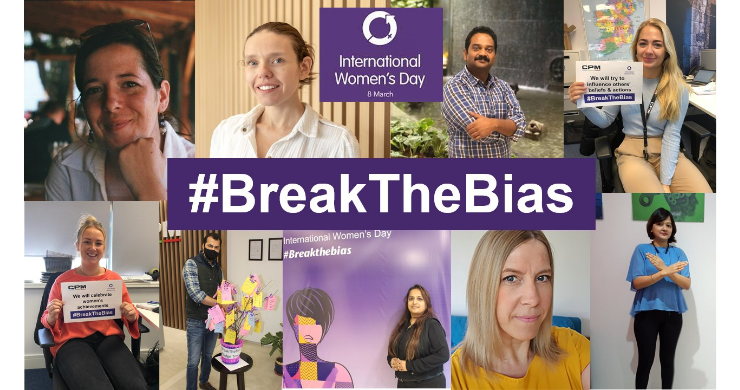
#IWD2022
At CPM, we are committed to creating an inclusive workplace culture where every person can feel valued and that they belong. Every year since 1997, we have thrown ourselves into celebrating #IWD. It's an important day for us to reflect on the experiences of women around the world. It enables us to stop and show we care about the impact women throughout CPM have with their colleagues, our clients, and the communities we are part of.
This year we invited representatives from around the business to share their thoughts and observations on this year's #IWD theme, #BreakTheBias.
Amandine Joret, Client Service Manager, CPM France
/AMANDINE%20JORET-4.jpg?width=281&name=AMANDINE%20JORET-4.jpg) What bias do you see in the world?
What bias do you see in the world?
Most societies in the world are patriarchal. Indeed, with rare exceptions, power is held by men in the collective unconscious. The bias is that today a woman cannot combine a professional career with a life as a mother. Either she is considered a workaholic and a ‘bad mother’, or she is considered to have no ambition and to put her family first.
What issues does this bias create? How does it make you / people feel?
Motherhood causes great upheaval in a woman, with consequences on her professional and personal life. In addition, there is a mental burden that increases when the mother wishes to reconcile everything but cannot because no support is provided. Finally, in terms of work/life balance, the figures show that women have the primary burden of taking time off to care for sick children. All of this impacts women’s career development and creates a sense of injustice.
What needs to happen to break this bias?
To break this bias, we need laws that evolve much more quickly with society’s needs. Extending maternity and paternity leave, raising parental leave pay, and supporting flexible working hours would be a step in the right direction. Other measures could include greater sick day provision, better childcare facilities and standardising breastfeeding at work.
What part will you play in breaking the bias?
I am a member of the CSE, and these questions about motherhood and the professional world are very important to me. To fight against these prejudices, I could talk more about maternity and work at the company level. We could make managers more aware of the difficulties that women can encounter during their post-partum period. Be benevolent; that is the major point.
Advice to others around how to challenge and overcome this bias?
My advice is that women in business need to speak out on these issues: YES, it is possible to be a mother and have a career today. American studies have shown that the more children a woman has, the more productive she is at work (better organisation, better compliance with deadlines to get home on time, etc.). Don’t consider motherhood as a hindrance but as a great opportunity.
Dominika Bialecka, HR Officer, CPM Ireland
/Image%20Dominika.jpg?width=239&name=Image%20Dominika.jpg)
What bias do you see in the world?
‘Similarity bias’ is something I see a lot, where people want to surround themselves with those with the same interests as them, both in private life and in work. As a result, they are close-minded and not open to making friendships with those who have different interests.
What issues does this bias create? How does it make you / people feel?
This bias, in particular, can create a division amongst groups in work and outside of work. For example, recruiters may subconsciously hire those with a similar work style as themselves.
What needs to happen to break this bias?
To break this bias, I think everybody must take it upon themselves to be more tolerant of inclusion, whether in the workplace or outside of work and make an effort to engage with everybody.
What part will you play in breaking the bias?
I will ensure I put in equal effort with everybody and be open-minded when building friendships.
Advice to others around how to challenge and overcome this bias?
I think the best advice would be to be broad-minded, never ‘judge a book by its cover’ and treat everybody equally.
Barnini Chatterjee, Program Manager, CPM India
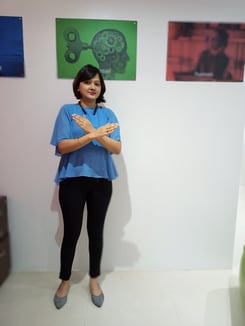 What bias do you see in the world?
What bias do you see in the world?
Biases, which are pre-conceived notions, are present almost everywhere. These are due to conditioning and cultural backgrounds, and they are largely passed down through generations. There is a growing polarisation now with people having strong opinions and biases based on culture, religious beliefs, political affiliations, gender, education, etc. These are very noticeable across all walks of life.
What issues does this bias create? How does it make you / people feel?
Biases can create barriers and hinder the actual assessment of a situation or a person. They can make people less confident and unsure about themselves. This can affect their mental wellbeing, work performance, and overall, their contribution to their work and society.
What needs to happen to break this bias?
With changing times, it is important to learn and unlearn. We should embrace change and accept people irrespective of their backgrounds and struggles. We need to see people through their work, capabilities, and commitment towards their work.
What part will you play in breaking the bias?
I will continue learning and unlearning myself constantly to understand the various biases and the reasons behind their existence. I will try and have conversations around it and have healthy interactions so that these biases can be slowly and steadily removed.
Advice to others around how to challenge and overcome this bias?
We should all be focussing on self-improvement and development constantly. Biases are hard to break, but with small continuous efforts, positive changes can surely be embraced by all of us.
Andrea Zervanova, CPM Recruiter in Bratislava, CPM ICC
/Andrea%20Zeranova.jpg?width=248&name=Andrea%20Zeranova.jpg) What bias do you see in the world?
What bias do you see in the world?
As a recruiter, I know some people will rarely get a call about a job simply because they are too old, too young, too experienced, overqualified, underqualified… If your name sounds exotic or your skin is of a different tone or colour, it may also lower your chances of getting chosen for a job. Mothers also experience bias. There is a bias that men who don’t have kids are better team members because mothers put their families first.
What issues does this bias create? How does it make you / people feel?
I feel pressure to prove something. When you realise it is only you that you need to prove something to, and no one else, it is better and more freeing, but not many people can realise that.
What needs to happen to break this bias?
We should accept that everyone is different. That some, even though young, are slower at grasping new ideas, while others who are older could be adaptable and dynamic. We need to see that mothers have the same right to work. That women should get paid for the amount of work the same as a man would. That the fact the person has darker skin has nothing to do with how the person thinks. We should also work on raising the self-confidence of people around us.
What part will you play in breaking the bias?
I look at the things I can improve to be a role model for those around me, most of all my children. I try to raise them to appreciate all the differences in every unique human being so that they can spot bias and call it out. I can truly say I am fighting bias in my own way, giving people their chance in the workplace.
Advice to others around how to challenge and overcome this bias?
Look for information. We are afraid of the things we don’t know. So, get to know the person, the race, the age group, get as much information as you can. And if you are the target of biased actions? Try to get help from other people. If it is in the workplace, call it out, ask for help, reach out. You do not have to fight it alone.
I just wanted to stress that I too fight biases and insecurities based on that. I am not perfect, and I don't want people to think that I am a role model and they can’t approach me.
We all fight our battles, and we think we are the only ones, but we all are in this together. It is important for me to let people know that it is ok to let the world know about your vulnerabilities because you will be surprised by how much support you will get from unexpected places or people. Together we can achieve anything!
Sonika G Saxena, Sr. Manager, CPM India
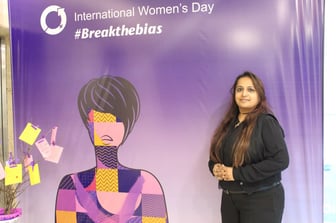 What bias do you see in the world?
What bias do you see in the world?
Some biases are obvious, and we might even recognise these tendencies in ourselves, and some are almost too subtle to notice. What personally bothers me is the ‘halo effect’. This is when one single trait of a person is used to make an overall judgment.
What issues does this bias create? How does it make you / people feel?
It makes me feel really unappreciated. People assess and judge others by how they feel. This bias distorts thinking and influences beliefs. A classic example is when women’s success is judged not by their hard work but by their womanhood.
What needs to happen to break this bias?
We need to highlight and showcase the hard work done by women and let a wider audience know why they deserve recognition and success.
What part will you play in breaking the bias?
I will ensure I highlight and showcase their efforts and confront people if I see any bias.
Advice to others around how to challenge and overcome this bias?
I would advise women not to stay silent and speak out when they experience bias. I would advise men to take a moment and consider that women might have succeeded or stepped up due to their hard work.
Catriona Micunovic, Client Service Director, CPM UK
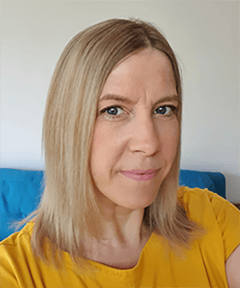 What bias do you see in the world?
What bias do you see in the world?
I see a lot of bias around age and experience. I often see individuals judged on what experience they have had or their length of time in a role. Often this is seen with a younger person not having ‘enough’ experience and automatically being judged for that. For women, the situation is compounded by maternity breaks impacting their ability to progress.
What issues does this bias create? How does it make you / people feel?
It impacts the individuals themselves, often affecting confidence around their abilities and their voice to speak out and ask for what they think they deserve. From a female perspective, this may be asking for a promotion, additional responsibilities or a pay rise. From an inexperienced person’s point of view, it could impact them being offered opportunities to grow and progress.
What needs to happen to break this bias?
We need to look at potential and open up opportunities to train within the role. We need to support women through family career breaks, especially on their return, to make sure they don’t feel they have to play catch-up. We also need to recognise the value of our younger colleagues’ opinions on the future of our operations.
What part will you play in breaking the bias?
I will champion our up-and-coming team members and expose them to opportunities to grow and input. I will challenge bias in our company if I see it. I will also educate on the benefits of inclusivity and, importantly, the impact of not embracing inclusivity on employee morale and business success. I will champion my female team members and offer my mentorship to help overcome some of the issues I encountered early in my career.
Vinay Vekkot, Head Business Solutions, CPM India
 What bias do you see in the world?
What bias do you see in the world?
Biases can be both unconscious and conscious. Unconscious biases based on stereotypes are most prevalent, which can undermine the interactions between genders. This can impact all genders, but it has the most impact on women within the work environment. While conscious bias is more visible, unconscious bias affects decisions limiting the opportunities given to women, ultimately impacting pay and promotions.
What issues does this bias create? How does it make you / people feel?
Biases create unequal work opportunities, which lead to lower motivation levels for almost 50% of the population. Quoting a few successful women does not solve this issue for the rest of the women in the world.
What needs to happen to break this bias?
Biases can only be broken by persistent awareness from childhood onwards. It is important to consciously avoid comments which enforce stereotypes. The steps to be taken need to be at the grassroots level to ensure a larger set of people can drive the change. It has to be everyone’s responsibility.
What part will you play in breaking the bias?
When allocating work, I will consider the whole team to ensure that opportunities are shared fairly across all genders. This slowly makes everyone a little more aware and sensitive to the issues and will help in making the workplace fairer for everyone.
Advice to others around how to challenge and overcome this bias?
Breaking the stereotype is the most important step. Start from your home.
Jade Cannon, Client Operations Analyst (CPM Ireland)
/IMG-6738.jpg?width=239&name=IMG-6738.jpg) What bias do you see in the world?
What bias do you see in the world?
Perception bias is clearly evident in today’s world. People are often judged and treated unfairly over-simplistic assumptions that have been made based on stereotypes.
What issues does this bias create? How does it make you / people feel?
This bias causes people to feel discriminated against, excluded and prejudged. For example, you may not be invited to watch the match after work because of your gender, or it could be assumed that you won’t want to join a physical activity because of your age.
What needs to happen to break this bias?
People need to forget what they might think they know about someone. Don’t assume a specific character trait based on age, gender or appearance.
What part will you play in breaking the bias?
I need to challenge my assumptions and make an effort to presume that people may be interested/open to anything.
Advice to others around how to challenge and overcome this bias?
It is essential to be inclusive. Think, what do I really know about this person, and why am I automatically assuming they might not want to do this? Be open and embrace the people around you. They might surprise you. 😊
Zia Ul Hussain, Sr. Manager, CPM India
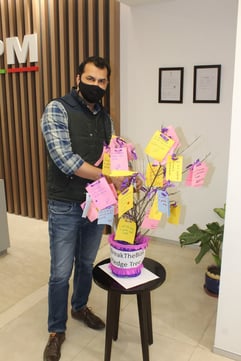 What bias do you see in the world?
What bias do you see in the world?
Women today are more qualified than ever in history, and it is proven they make faster and greater progress when given a chance. However, we only have around 13% of them representing parliament, and less than 6% of CEOs in S&P 500 companies are women. The numbers are self-explanatory.
What issues does this bias create? How does it make you / people feel?
It is a vicious cycle. It leads to a power gap in economies and the political system, affecting every woman in every aspect of life.
What needs to happen to break this bias?
Education and even distribution of power can help address the issue.
What part will you play in breaking the bias?
I do my bit in my purview. I encourage my daughter to shatter the glass ceiling, and I do the same with all colleagues in my team.
Advice to others around how to challenge and overcome this bias?
Behind every successful woman is herself, and behind every successful man, there is a woman. So let’s optimise.
At CPM, we always encourage inclusiveness and integrity. It’s in our DNA that we care, we’re curious and we achieve together. Contact us now if you want to be a part of the CPM family.

/Pride/Pride%202022/Allyship%20and%20Representation%20(740%20%C3%97%20390%20px)%20(1).png)

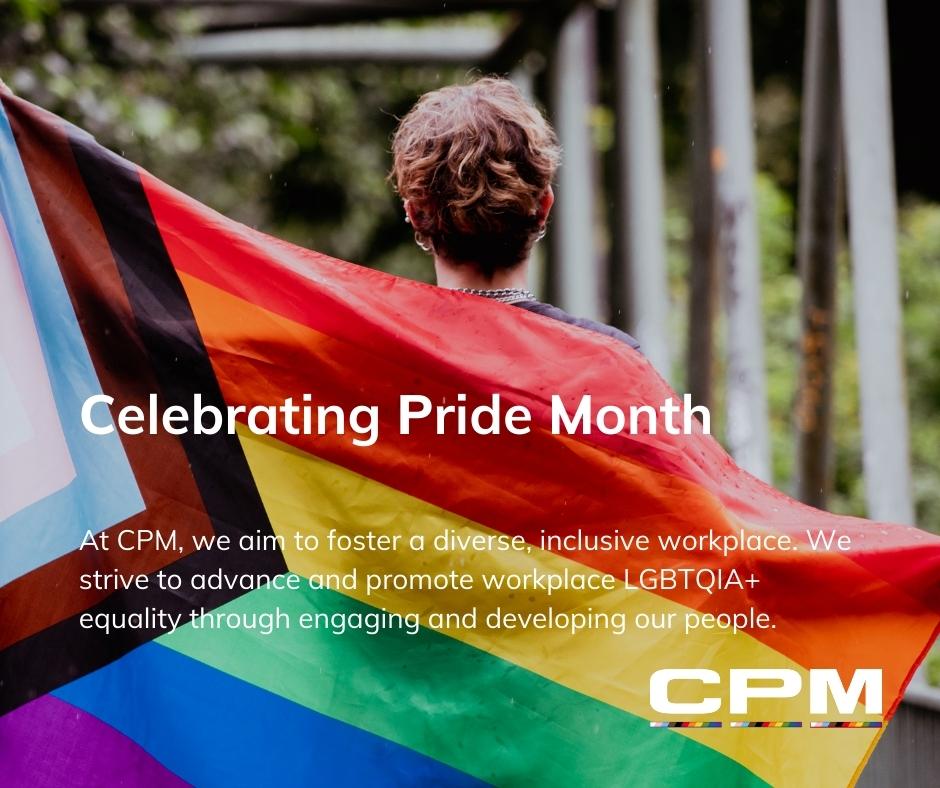
/Pride/Pride%202022/CPM%20Pride%20float%202022.jpg)
